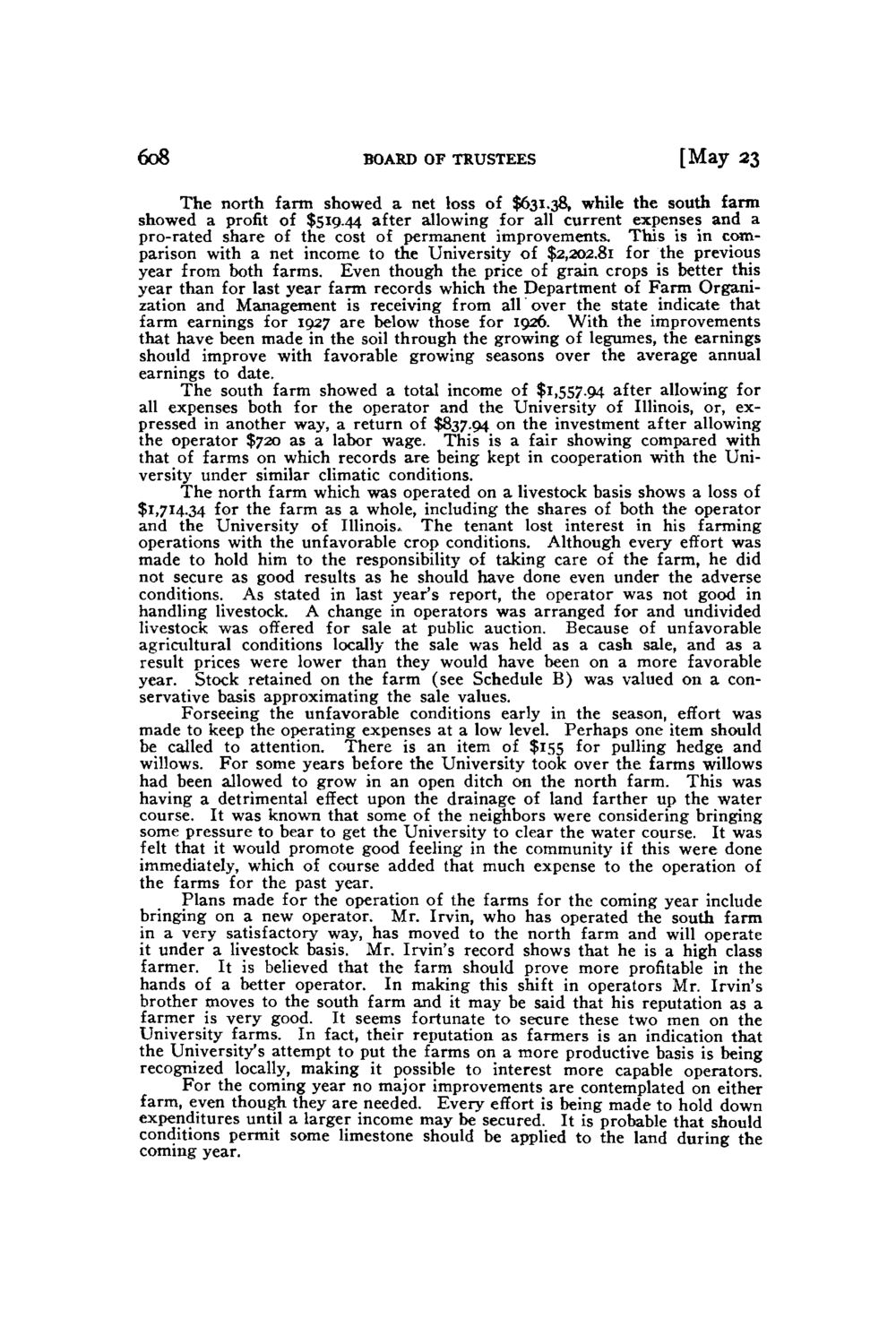| |
| |
Caption: Board of Trustees Minutes - 1928
This is a reduced-resolution page image for fast online browsing.

EXTRACTED TEXT FROM PAGE:
6o8 BOARD OF TRUSTEES [ M a y 23 The north farm showed a net loss of $631.38, while the south farm showed a profit of $519.44 after allowing for all current expenses and a pro-rated share of the cost of permanent improvements. This is in comparison with a net income to the University of $2,202.81 for the previous year from both farms. Even though the price of grain crops is better this year than for last year farm records which the Department of Farm Organization and Management is receiving from all over the state indicate that farm earnings for 1027 are below those for 1926. With the improvements that have been made in the soil through the growing of legumes, the earnings should improve with favorable growing seasons over the average annual earnings to date. The south farm showed a total income of $1,557.94 after allowing for all expenses both for the operator and the University of Illinois, or, expressed in another way, a return of $837.94 on the investment after allowing the operator $720 as a labor wage. This is a fair showing compared with that of farms on which records are being kept in cooperation with the University under similar climatic conditions. The north farm which was operated on a livestock basis shows a loss of $1,714.34 for the farm as a whole, including the shares of both the operator and the University of Illinois* The tenant lost interest in his farming operations with the unfavorable crop conditions. Although every effort was made to hold him to the responsibility of taking care of the farm, he did not secure as good results as he should have done even under the adverse conditions. A s stated in last year's report, the operator was not good in handling livestock. A change in operators was arranged for and undivided livestock was offered for sale at public auction. Because of unfavorable agricultural conditions locally the sale was held as a cash sale, and as a result prices were lower than they would have been on a more favorable year. Stock retained on the farm (see Schedule B ) was valued on a conservative basis approximating the sale values. Forseeing the unfavorable conditions early in the season, effort was made to keep the operating expenses at a low level. Perhaps one item should be called to attention. There is an item of $155 for pulling hedge and willows. For some years before the University took over the farms willows had been allowed to grow in an open ditch on the north farm. This was having a detrimental effect upon the drainage of land farther up the water course. It was known that some of the neighbors were considering bringing some pressure to bear to get the University to clear the water course. It was felt that it would promote good feeling in the community if this were done immediately, which of course added that much expense to the operation of the farms for the past year. Plans made for the operation of the farms for the coming year include bringing on a new operator. Mr. Irvin, w h o has operated the south farm in a very satisfactory way, has moved to the north farm and will operate it under a livestock basis. Mr. Irvin's record shows that he is a high class farmer. It is believed that the farm should prove more profitable in the hands of a better operator. In making this shift in operators Mr. Irvin's brother moves to the south farm and it may be said that his reputation as a farmer is very good. It seems fortunate to secure these two men on the University farms. In fact, their reputation as farmers is an indication that the University's attempt to put the farms on a more productive basis is being recognized locally, making it possible to interest more capable operators. For the coming year no major improvements are contemplated on either farm, even though they are needed. Every effort is being made to hold down expenditures until a larger income m a y be secured. Itto probable that should coming year. conditions permit some limestone should be applied is the land during the
| |